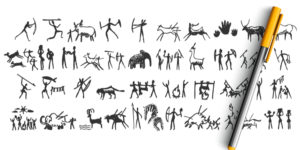
Today, despite the vast choice of food from every corner of the world available from the shelves of our local supermarket, we don’t seem to be correspondingly healthier than our distant relatives. Perhaps a look back at our genetic origins might help us discover where we are going wrong.
A study by *Ralph Sanchez, L.Ac.,CNS,D.Hom, suggests that “this mismatch between our modern diet and lifestyle and our Palaeolithic genome is playing a substantial role in the ongoing epidemics of obesity, hypertension, diabetes, and atherosclerotic cardiovascular disease”.
Studies show that our ancestors remained free of these apparently modern diseases but he reminds us that until 500 years ago we ate only feral and natural food and we had to expend energy foraging for it.
Live like caveman?

The message seems to be simple, live like a caveman. While we might shirk from the idea of cave dwelling, we could certainly use the hunter gatherer lifestyle for inspiration.
Before the agricultural revolution staple foods were obtained from foraging for nuts, berries and leaves, often over several miles.
Since eating meat meant hunting wild game, it would have almost certainly been leaner and eaten less frequently than modern domestic livestock we consume today.
The hunter gatherer in you

While the days of wandering for miles in search of the odd berry and going out on the trail of the nearest Woolly Mammoth may be long gone, there is little doubt that most of us would benefit from renewing that basic connection with our food that seems to have been lost in modern times.
Recent increasing awareness of the health and taste benefits of fresh, home grown food and ethically produced meat, perhaps idealised by the likes of Hugh Fearnley-Whittingstall and Jamie Oliver, could be an indication of the awakening of the hunter gatherer in us all.
